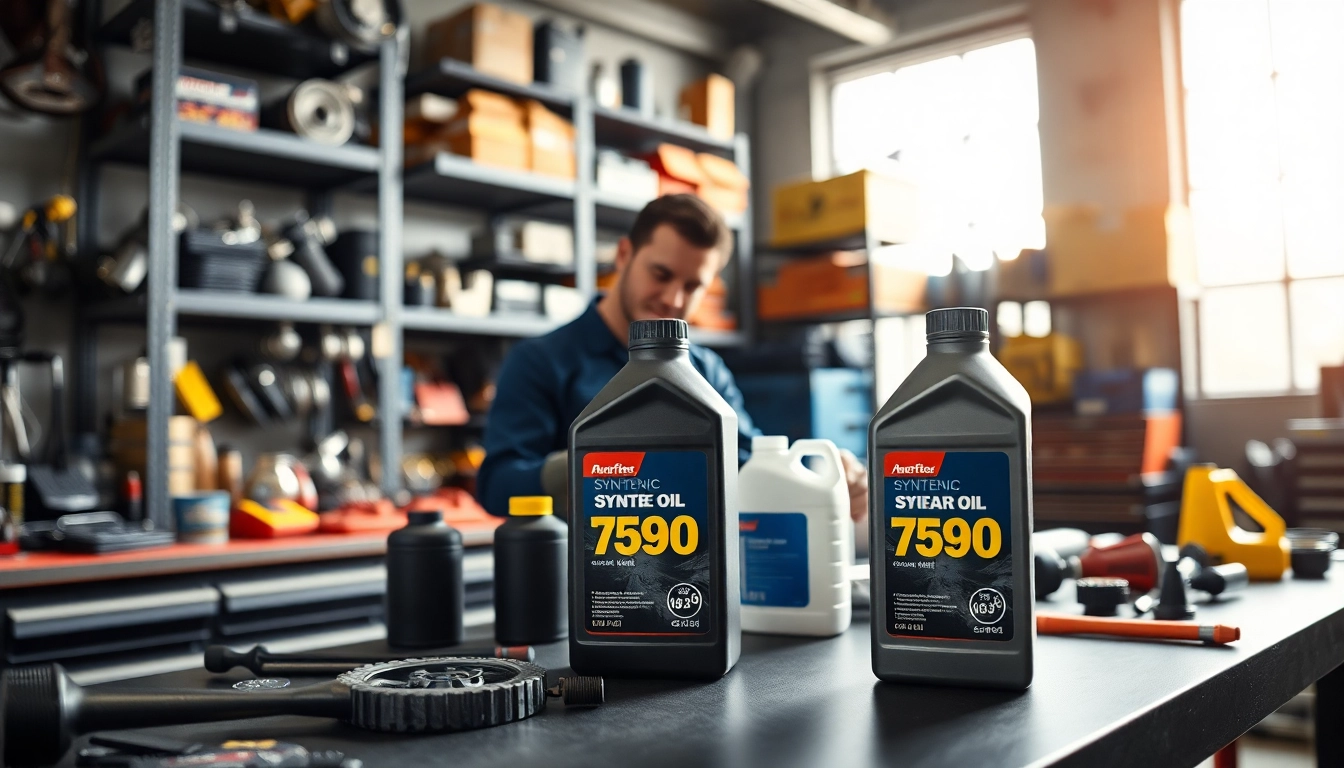Introduction to Synthetic Gear Oil 75W90
Synthetic gear oil 75W90 serves as a vital component in extending the lifespan and improving the performance of various automotive and mechanical systems. It is specifically formulated to offer superior lubrication compared to conventional oils, particularly in applications requiring high resistance to extreme pressures and temperatures. In this comprehensive guide, we will explore essential aspects of synthetic gear oil 75W90, shedding light on its advantages, applications, and the optimal ways to maintain your vehicle’s gear systems.
For those seeking further insights on synthetic oil changes and vehicle maintenance, check out our article on synthetic gear oil 75w90.
What is Synthetic Gear Oil?
Synthetic gear oil is a lubricant specifically designed for use in gearboxes, differentials, and manual transmissions. Unlike conventional mineral oils, synthetic oils are chemically engineered to provide enhanced performance characteristics. They include additives that improve their stability and functionality in demanding conditions. These lubricants offer superior protective properties, which contribute significantly to the efficiency and longevity of automotive and mechanical systems.
Why Choose 75W90 Viscosity?
The numbers in the title 75W90 refer to the viscosity grades according to the Society of Automotive Engineers (SAE) classification. The “75” indicates the oil’s low-temperature viscosity, while “90” represents its high-temperature viscosity. This dual-grade viscosity prevents oil from becoming too thick in colder temperatures while still providing robust performance under heat. The 75W90 viscosity is particularly favored because of its versatility, making it suitable for a wide range of applications, including both light-duty and heavy-duty vehicles.
Common Applications and Uses
Synthetic gear oil 75W90 is commonly used in:
- Manual transmissions: Its properties provide optimal lubrication in gear shifting mechanisms, enhancing driver experience.
- Differentials: The oil is crucial for protecting and increasing the lifespan of differentials, particularly in vehicles exposed to heavy loads or towing.
- Transfer cases: In four-wheel-drive vehicles, the oil aids in seamless transitions between high and low gears.
- Heavy-duty applications: Including trucks and agricultural vehicles, where load demands are significant.
Advantages of Using Synthetic Gear Oil 75W90
Improved Performance in Extreme Conditions
One of the standout features of synthetic gear oil 75W90 is its ability to perform effectively under extreme conditions. It maintains its viscosity better than conventional oils when exposed to both high temperatures and heavy loads. This resilience helps prevent oxidative breakdown, which can lead to component wear and failure. Furthermore, synthetic oils exhibit superior cold-weather performance, ensuring that the oil flows and lubricates even in frigid conditions.
Enhanced Protection Against Wear and Tear
Wear and tear can significantly shorten the lifespan of mechanical components. Synthetic gear oil 75W90 includes advanced additives that enhance its protective properties, forming a protective film around moving parts. This film reduces friction and minimizes metal-to-metal contact, which is crucial for preventing wear over time. Notably, many synthetic oils also contain anti-wear additives such as zinc dialkyldithiophosphate (ZDDP) that further enhance protection, particularly in high-load scenarios.
Increased Lubrication Efficiency
Thanks to its formulation, synthetic gear oil 75W90 has a lower coefficient of friction compared to conventional oils. This property translates into less energy loss due to friction, leading to improved fuel efficiency. In racing and performance applications, this can mean the difference between winning and losing. Moreover, less friction means reduced heat generation, improving overall component durability and performance reliability.
How to Choose the Right Synthetic Gear Oil 75W90
Understanding Product Labels and Specifications
When purchasing synthetic gear oil 75W90, it’s essential to understand the various labels and specifications often found on products. Look for oils that comply with API (American Petroleum Institute) and SAE standards, which indicate that the oil has met certain performance criteria. For instance, the GL-5 specification ensures that the gear oil contains additives suitable for hypoid gearsets and can handle high-stress applications.
Key Manufacturers and Brands
Several key manufacturers dominate the synthetic gear oil market. Brands such as Mobil, Valvoline, and AMSOIL have established reputations for quality. Researching the product formulations and performance claims of these brands will help you make an informed decision based on your vehicle’s requirements and your personal preferences.
Reading Customer Reviews and Feedback
While technical specifications are crucial, real-world performance is best evaluated through customer reviews. Look for feedback on performance, especially regarding longevity and effectiveness under varied driving conditions. Websites like forums, automotive blogs, and product review sites can provide valuable insights into how different oils perform in similar applications as yours.
Service Intervals and Maintenance Tips
When to Change Your Gear Oil
Regular changes of synthetic gear oil are paramount to ensuring mechanical reliability. Generally, replacing your gear oil every 30,000 to 60,000 miles is advisable, depending on driving conditions. For vehicles that frequently endure heavy towing, off-roading, or racing conditions, more frequent changes may be required. Always consult your owner’s manual for the manufacturer’s recommendations.
Performing a Gear Oil Change
Changing your gear oil is a relatively straightforward process, but it does require some attention to detail:
- Gather materials: You’ll need a wrench, gear oil pump or funnel, a drain pan, and the correct amount of synthetic gear oil 75W90.
- Warm up the vehicle: Gently running the vehicle for a few minutes can help thin the oil, allowing it to drain more easily.
- Drain the old oil: Locate the drain plug, remove it, and allow the old oil to flow into the pan completely.
- Replace the drain plug: Once the old oil has drained, clean the drain plug and reinsert it securely.
- Fill with new oil: Use the pump or funnel to fill in the new synthetic gear oil until it reaches the level specified in your owner’s manual.
- Check for leaks: After changing the oil, run the vehicle briefly and check for any signs of leakage around the drain plug and fill cap.
Signs You Need to Replace Your Gear Oil
Several indicators can signal that it’s time to replace your gear oil:
- Unusual noises: Grinding or whining noises during gear changes or while in gear may indicate insufficient lubrication.
- Overheating: Noticeable heat from the transmission housing can indicate failing oil.
- Strange odors: A burnt smell from the gearbox can suggest oil degradation.
- Discoloration: If the oil appears dark or muddy, it may be time for a change.
Conclusion and Best Practices for Synthetic Gear Oil Use
Frequently Asked Questions
Understanding synthetic gear oil 75W90 can raise several questions:
What is 75W90 synthetic gear oil used for?
It’s primarily used in various mechanical applications, including manual transmissions, differentials, and transfer cases, enhancing performance and longevity.
Does synthetic gear oil make a difference?
Yes, synthetic gear oil offers better lubrication, decreased friction, and improved performance in extreme conditions compared to conventional oils.
Is Mobil 75W90 gear oil fully synthetic?
Yes, Mobil 1 Syn Gear Lube LS is a fully synthetic formulation designed for superior performance across various applications.
Regular Maintenance Routines
Incorporating regular maintenance checks for your gear oil levels and quality will save you time and money in the long run. Remember to keep track of mileage and driving conditions to establish a consistent gear oil replacement schedule that suits your specific needs.
Consulting Professional Mechanics
While many car enthusiasts may prefer DIY maintenance, consulting professionals can offer peace of mind. Mechanics can not only provide expert advice on the best products based on your vehicle’s make and model but also identify underlying issues that may not be visible during a routine oil check.















Leave a Reply